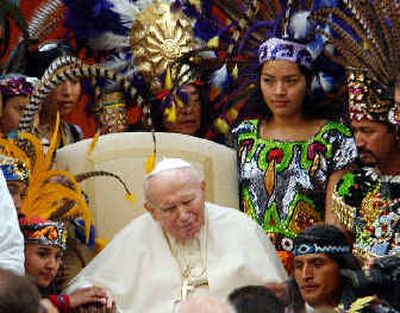Latin America will challenge pope’s successor

RIO DE JANEIRO, Brazil – Home to nearly half of the world’s Roman Catholics, Latin America was a priority for Pope John Paul II and will surely prove a challenge for his successor.
John Paul helped oust right-wing dictatorships in South America shortly after becoming pope in 1978. He helped broker peace between dictatorships in Chile and Argentina that were near war, then supported pro-democracy opponents of dictatorships across the region.
“He was a pope who fought for democratic liberties in Latin America. When he came to power there were many dictatorships still and he helped precipitate the re-democratization of Brazil” and most of the region, said Clodovis Boff, a historian.
More recently, in 1998 John Paul pushed Cuban dictator Fidel Castro to allow the church to resume a public role and to reopen a convent.
John Paul also frowned on the Marxist-tinged liberation-theology movement that rocked the church in Latin America in the 1980s, when many younger priests backed leftist insurgencies in Central America to “free” the poor from rich ruling families.
The church initially sided with the Marxist Sandinista movement in Nicaragua. But John Paul stood with President Ronald Reagan in his Cold War bid to keep socialist governments from gaining power in Central America. John Paul was jeered in Nicaragua when he said the church stood with the poor but believed Marxism was at odds with freedom.
“He said priests were becoming politicians, but he was a politician of note,” said Rodrigo Paez Montealban, a sociologist at the National Autonomous University in Mexico City.
The pope displayed his political skills perhaps best in Mexico, the second most-populous Catholic nation. His first papal trip was to the Dominican Republic and Mexico. The church had been on the defensive since the anti-clerical Mexican revolution of 1910-1917. But after repeated papal visits, then-President Carlos Salinas de Gortari in 1992 renewed the church’s legal standing in Mexico.
Throughout Latin America, many separated respect for John Paul from aversion to his rigid message against birth control. Studies show that many Mexican and Brazilian women practice birth control in defiance of church teachings.
His successor will face steep challenges. Brazil has the largest number of African descendants outside Africa, and many are turning to a growing African-mysticism movement.
The Catholic Church is losing ground even faster to a growing Christian evangelical movement that has won many congressional seats and is influencing Brazilian culture.
In Bolivia and Ecuador, indigenous leaders are seizing power and view the church as complicit in their long history of oppression.